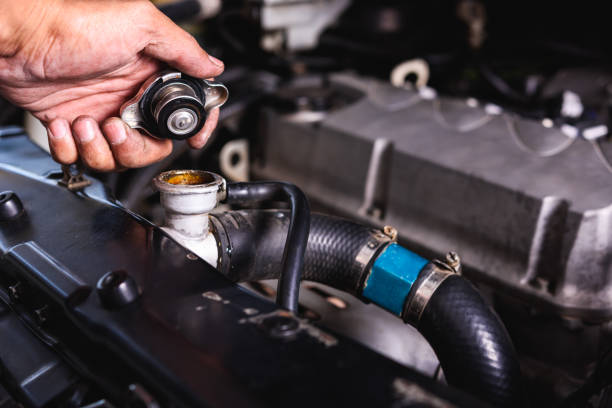Nigeria’s climate, especially during the dry season, can be unforgivingly hot. The sweltering temperatures take a toll not only on people but also on cars. Among the critical components ensuring your vehicle remains operational under such conditions is the radiator. Understanding the importance of radiators and maintaining them properly can make a significant difference in your car’s performance and longevity.
What is a Radiator?
The radiator is a vital component of your car’s cooling system. Its primary role is to dissipate heat from the engine to prevent overheating. The engine generates substantial heat as it burns fuel to produce power. Without a mechanism to manage this heat, the engine can suffer severe damage, leading to expensive repairs.
How Do Radiators Work?
Radiators work by circulating a coolant—a mixture of water and antifreeze—through the engine. As the coolant absorbs heat from the engine, it flows into the radiator. Here, the heat is transferred to the radiator’s thin metal fins and dissipated into the surrounding air, often with the help of a cooling fan. The cooled fluid then returns to the engine to repeat the cycle.
Why are radiators crucial during Nigerian heat waves?
1. Preventing Engine Overheating
Nigeria’s extreme heat, especially in cities like Kano, Abuja, and Lagos, can push your car’s engine to its limits. An efficient radiator ensures the engine temperature remains within a safe range, preventing overheating that could lead to engine failure.
2. Maintaining Optimal Engine Performance
Engines are designed to operate efficiently within a specific temperature range. If an engine runs too hot, its performance and fuel efficiency can drop. A functioning radiator ensures that the engine remains cool, promoting optimal performance.
3. Avoiding Costly Repairs
Overheating can cause critical damage to engine components such as the cylinder head, pistons, and gasket. Repairs for such damage can be costly, often requiring extensive labor and parts replacement. Regular maintenance of your radiator can save you from these expenses.
4. Prolonging Vehicle Lifespan
A well-maintained cooling system, centered around the radiator, helps ensure your engine’s longevity and, by extension, your car. The radiator plays a pivotal role in prolonging the vehicle’s life by preventing overheating and maintaining engine efficiency.
Signs of Radiator Issues
Recognising potential radiator problems early can save you from breakdowns and expensive repairs. Look out for the following warning signs:
- Rising Temperature Gauge: If your car’s temperature gauge consistently moves toward the red zone, it could indicate radiator issues.
- Coolant Leaks: Puddles of coolant under your car are a clear sign of leaks.
- Rust or corrosion: Visible rust or corrosion on the radiator surface can impair its ability to dissipate heat.
- Frequent Overheating: If your car overheats often, the radiator may not be functioning correctly.
- Low Coolant Levels: Rapidly decreasing coolant levels might point to leaks or other system issues.
Tips for Maintaining Your Radiator in Nigeria
1. Regular Coolant Checks and Top-Ups
Check your coolant level frequently and ensure it’s topped up with the right coolant mixture. Using only water is not advisable, as it lacks the necessary antifreeze properties to prevent rust and corrosion.
2. Flush the Radiator Periodically
Over time, debris, rust, and sludge can accumulate inside the radiator, reducing its efficiency. Flushing the radiator every 30,000 kilometers or as recommended by your vehicle manufacturer can help maintain optimal performance.
3. Inspect Hoses and Connections
Radiator hoses and connections can develop cracks or leaks due to prolonged exposure to heat and pressure. Regular inspections can help you identify and fix these issues before they worsen.
4. Clean the Radiator’s Exterior
Dust, dirt, and debris can clog the radiator’s fins, impeding airflow. Cleaning the radiator’s exterior with a soft brush or compressed air ensures efficient heat dissipation.
5. Monitor the Thermostat
The thermostat regulates coolant flow between the engine and the radiator. A faulty thermostat can lead to overheating or undercooling. Replace it if it’s malfunctioning.
6. Use Quality Coolant
Not all coolants are created equal. Use high-quality coolant designed for your car’s make and model. Avoid mixing different types of coolant, as this can reduce their effectiveness.
7. Professional Inspections
While basic checks can be done at home, professional inspections by a trusted mechanic are essential. They can identify hidden issues and ensure that your radiator and cooling system are in excellent condition.
Common Radiator Problems in Nigerian Conditions
1. Overheating
The intense heat during Nigerian heatwaves can challenge even the best-maintained cooling systems. Overheating often results from insufficient coolant, clogged fins, or faulty components.
2. Leaks
Poor road conditions and extreme temperatures can cause wear and tear on radiator components, leading to leaks.
3. Rust and Corrosion
High humidity levels, combined with improper coolant mixtures, can lead to rust and corrosion, which compromise radiator efficiency.
4. Fan Malfunctions
The cooling fan aids in dissipating heat from the radiator. Fan issues, such as a blown fuse or motor failure, can reduce the radiator’s ability to cool the engine.
Choosing the Right Radiator for Your Car in Nigeria
If your radiator needs replacement, selecting the right one is crucial. Consider the following factors:
- Compatibility: Ensure the radiator matches your car’s make and model.
- Material: Radiators are typically made of aluminum, plastic, or copper. Aluminum radiators are lightweight and durable, making them suitable for Nigerian conditions.
- Core Design: Choose a radiator with an efficient core design for better cooling performance.
- Brand Reputation: Opt for radiators from reputable brands to ensure quality and reliability.
Conclusion
In Nigeria’s harsh climatic conditions, the radiator’s role in maintaining your car’s performance cannot be overstated. Regular maintenance, prompt attention to warning signs, and using quality components will ensure your radiator functions efficiently, keeping your engine cool even during the hottest heat waves.
Taking care of your radiator isn’t just about avoiding breakdowns; it’s about safeguarding your investment in your vehicle and ensuring safe and reliable transportation. Stay proactive, and your car will thank you for it, even in the most extreme Nigerian weather.

